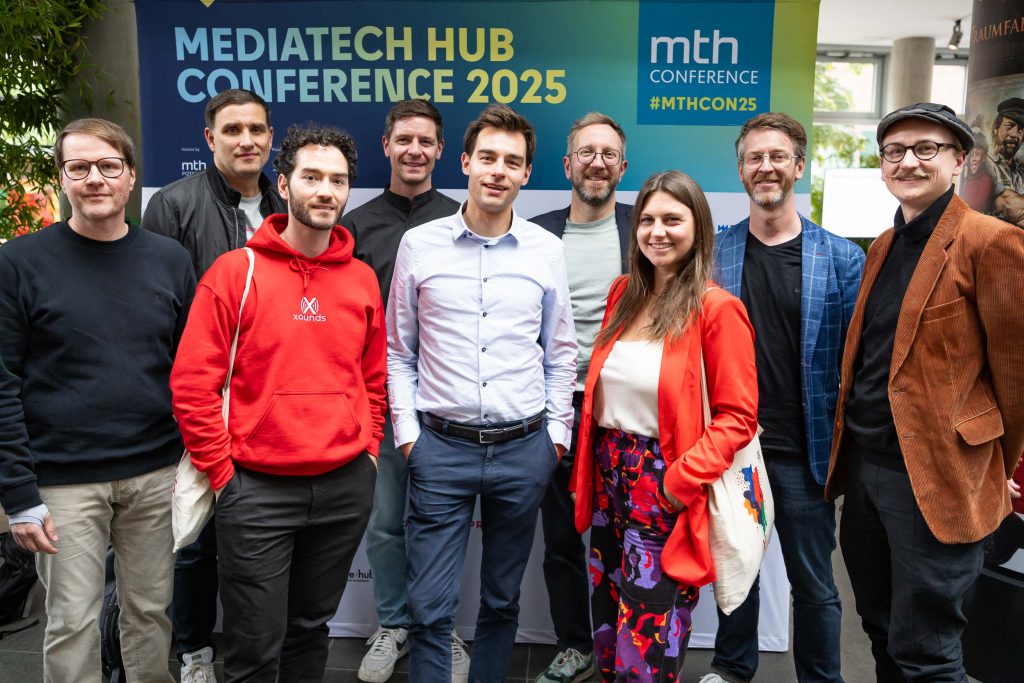From 24 to 25 September 2025, this year’s MediaTech Hub Conference took place. Over two days, innovators and creatives from the media industry, leading figures from the film, TV and streaming markets, as well as emerging startups and investors, gathered at the historic Studio Babelsberg. Current developments and industry trends were presented, groundbreaking new tools were showcased, and a glimpse was given of what the future may hold.
The MTH Conference opened with a keynote by actress, screenwriter and director Maria Schrader, who gained international recognition through the Netflix miniseries Unorthodox (2020) and the Hollywood-produced journalism drama She Said (2022). In her speech, she emphasised that technology has always formed the foundation of filmmaking since the very beginning. It has always been the “pen” in the artist’s hand. However, referring to generative artificial intelligence (GenAI), Maria Schrader posed the question of whether this technology is still the pen guided by the artist’s hand – or whether generative AI has now become its own hand. A question that was addressed throughout much of the programme – sometimes more directly, sometimes less so.
Rishi Coupland, Director of Research and Industry Innovation at the British Film Institute (BFI), shared insights from the first UK-wide study on GenAI in film, TV and gaming. It became clear that current use cases are only the beginning – with the potential for far-reaching changes across the entire production process. On the panel “GenAI for the Audiovisual Industry: From Social Media to Broadcast to High-End Production”, representatives from ByteDance, Amazon (AWS), Google and FilmLight demonstrated the power of GenAI tools in producing audiovisual content. And in the session on the “Brain Rot Phenomenon”, Linette Zaulich (Head of B2C & Director Unscripted, ZDF Studios), Nat Poulter (VP Digital & Commercial, BBC Studios), and Robin Blase (Content Creator and CEO, Richtig Cool GmbH) debated whether, in the face of an overwhelming flood of “brain rot” content – often created cheaply with AI and consumed by young people – there is still an audience for more challenging material on social media.
Although AI dominated the debates, the MTH Conference 2025 also shone a light on other, no less important topics. Experts from RTL, ITV Studios and Samsung TV discussed in the session “Navigating Multiplatform Distribution”how audiences can be reached across platforms. Meanwhile, in the talk “Who Owns the Feed? Journalism, Regulation and the Hidden Architecture of News”, organised by the Media Innovation Centre Babelsberg (MIZ), speakers examined the power of platforms, control over information, and the impact of AI on journalistic content.
GUEST OF HONOUR: DENMARK INTRODUCES ITSELF
Denmark, this year’s guest country, also presented itself at #MTHCON25. In the session “The Film, TV & Streaming Industry in Denmark”, experts from Nordisk Film, the Danish Producers’ Association and the Royal Danish Embassy in Germany gave insights into the importance of film and series production for the country, and why Denmark increasingly relies on international co-productions and partnerships with streamers.
Three innovative Danish startups also took to the MTH Conference stage to showcase their work:
- Connie – offers creator-friendly tools with a focus on privacy, ethical standards and European values.
- Marionette XR – develops real-time, single-camera motion capture for animation, visual effects and interactive media.
- Kaspar AI – presented K1, an AI-powered search engine for Adobe Premiere Pro.
MTHCON25 PROUDLY PRESENTS: MTH STARTUP DEMO DAY #1
Speaking of startups: this year’s MTH Conference hosted the very first MTH Startup Demo Day. A total of eight startups from the MediaTech Hub Accelerator portfolio had the chance to present themselves to an audience of investors, industry experts and peers, and to pitch their ideas. The jury – Katja Kühnel (Brandenburg Kapital), Steffen Seifarth (Business Angels Club Berlin e.V. – BACB), Hanna Malin Sasse (HTGF), Malte Lindigkeit (bmp Ventures), Frederike Wolff (Redstone) and Antonia Kuffler (seed + speed Ventures) – then had the difficult task of selecting a winner.
The Demo Day opened with the session “The Startup Ecosystem in Brandenburg”. Vincent Favrat, Managing Partner at Oⁿ, the Symbiotic Venture Studio, presented an AI tool capable of generating business models for diverse sectors and needs. He was then joined by Katja Kühnel and Katja Richter (CEO, MTH Potsdam) to discuss the opportunities Brandenburg and Potsdam offer to young founders, as well as the challenges that remain and what is still needed to further strengthen the ecosystem.
STARTUP PITCHES AND AWARD CEREMONY
The startups then took to the stage to pitch their business models. The prize: €5,000. Competing were: Anita Legal, EINBLIQ.iO, DARC (Data and Research Center), BrandPatrol, Xounds, Sectorlens, nound and Gretchen AI. (An overview with short descriptions of the teams is available here.)
At the award ceremony, the winner was announced: Gretchen AI. According to the jury, the decision was above all due to the relevance and timeliness of Gretchen AI’s solution – and the team’s ability to turn its innovative idea into practice.
WINNER OF THE MTH STARTUP DEMO DAY: GRETCHEN AI
But what exactly is so relevant and topical about Gretchen AI’s business model? Tim Polzehl, Senior AI Expert and Co-Founder of Gretchen AI, explained:
“Today, we face the problem that we no longer know which information we can trust and which has been synthetically generated with AI. Many people believe that you can simply build AI detectors and gain security that way. But that is not the case. It’s important to understand that even when you check an image for deepfakes, you always have to provide evidence – and deep detection will never reach 100 percent accuracy.”
That forms the basis of Gretchen AI’s idea, says Polzehl:
“We go looking for evidence, almost like forensics. We search for source material, different narratives, and know who published what. From this, we can compile a highly detailed situational picture – for example for fact-checking or editorial teams.” In short: Gretchen AI provides a tool for content verification.
For editorial teams, the main benefit is saving time. Gretchen AI has been working with the German Press Agency (dpa) for about half a year, gaining valuable insight into what matters most in verifying news. At the same time, dpa has benefited from the tool: “In test runs with dpa, the time needed for media verification was reduced by 500 percent,” says Polzehl. “What once took an hour, we can now complete in just minutes.”
The company itself is still young. Gretchen AI is a spin-off from the German Research Centre for Artificial Intelligence (DFKI) and has only been operating since early 2025. Polzehl is also a partner in the research project news-polygraph. Since August 2025, the team has been part of the third batch of the MTH Accelerator’s Investment Readiness Programme.
We would like to once again warmly congratulate Gretchen AI on winning the MTH Startup Demo Day. We also thank all the other startups for taking part in the pitches and wish every team great success on their journey ahead!
Finally, a big thank you to everyone who joined us at the MediaTech Hub Conference 2025. It was wonderful to have you with us. See you next year at MTHCON26!



